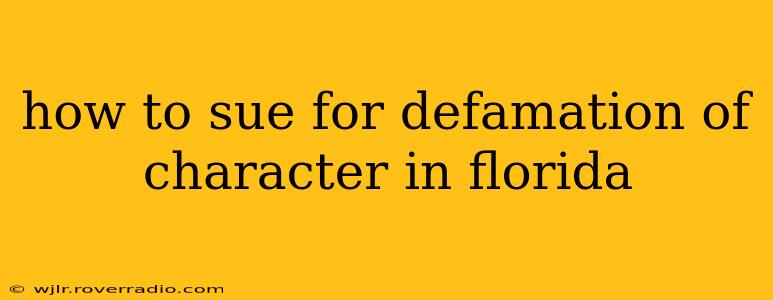How to Sue for Defamation of Character in Florida
Defamation of character, also known as libel (written) or slander (spoken), involves the communication of false statements that harm someone's reputation. Suing for defamation in Florida requires careful consideration of several legal factors. This guide provides an overview, but it's crucial to consult with a qualified Florida attorney for personalized legal advice. This information is for educational purposes only and does not constitute legal advice.
Understanding Florida's Defamation Laws
Florida law requires you to prove several elements to successfully sue for defamation:
- A false statement: The statement must be demonstrably untrue. Simply being critical or expressing an opinion doesn't constitute defamation. The statement must be a statement of fact.
- Publication: The false statement must have been communicated to at least one person other than the plaintiff. This could be through written words, spoken words, pictures, or even gestures.
- Fault: The level of fault required depends on who the plaintiff is. For private individuals, the plaintiff must prove negligence—that the defendant acted carelessly in publishing the false statement. For public figures (like celebrities or politicians), the plaintiff must prove actual malice—that the defendant knew the statement was false or recklessly disregarded whether it was true or false. This higher standard is significantly more difficult to meet.
- Damages: The plaintiff must prove they suffered harm as a result of the false statement. This can include financial losses, emotional distress, or damage to reputation.
What Constitutes Defamation in Florida?
Florida courts are careful to protect free speech. Mere insults, opinions, or statements that are not verifiable as fact are usually not considered defamatory. However, the following types of statements can lead to a successful defamation lawsuit if the other elements are met:
- False accusations of criminal activity: Accusing someone of committing a crime they didn't commit is a serious form of defamation.
- False statements about professional competence: Statements that falsely claim someone is incompetent or unethical in their profession can be defamatory.
- False statements about sexual behavior or morality: Spreading false rumors about someone's sexual conduct or morality can be grounds for a lawsuit.
- False accusations of loathsome disease: Falsely accusing someone of having a contagious or socially stigmatized disease is also actionable.
Frequently Asked Questions (FAQs)
H2: What is the Statute of Limitations for Defamation in Florida?
The statute of limitations for defamation in Florida is generally two years from the date of publication of the defamatory statement. This means you must file your lawsuit within two years of the statement being made public.
H2: Do I need an attorney to sue for defamation?
While it's theoretically possible to file a defamation lawsuit yourself (pro se), it's strongly recommended you hire a qualified Florida attorney. Defamation law is complex, and an attorney can help you navigate the legal process, gather evidence, and build a strong case.
H2: What kind of damages can I recover in a defamation lawsuit?
Damages can include compensatory damages (to compensate for actual losses, like lost income or emotional distress) and punitive damages (to punish the defendant for particularly egregious conduct). The amount of damages awarded varies greatly depending on the specifics of the case.
H2: What evidence do I need to prove defamation?
Evidence can include copies of the defamatory statement (e.g., a screenshot of a social media post, a recording of a conversation), witness testimony, and expert testimony to establish the falsity of the statement and the damage it caused.
H2: What if the defamatory statement was made online?
Online defamation is treated the same as other forms of defamation. The same elements must be proven, and the platform where the statement was made may also play a role in determining liability (e.g., Section 230 of the Communications Decency Act offers some protections to online platforms).
H2: Is it difficult to win a defamation case?
Yes, defamation lawsuits are often difficult to win, especially against public figures. The high burden of proof and the strong protection afforded to free speech under the First Amendment make successful litigation a challenge. The help of an experienced attorney is essential.
Conclusion:
Successfully suing for defamation in Florida requires a strong understanding of the law and a compelling case. Consult with a Florida defamation attorney to assess your situation and determine if you have a viable claim. Remember, acting hastily without professional legal counsel can negatively impact your chances of success.
